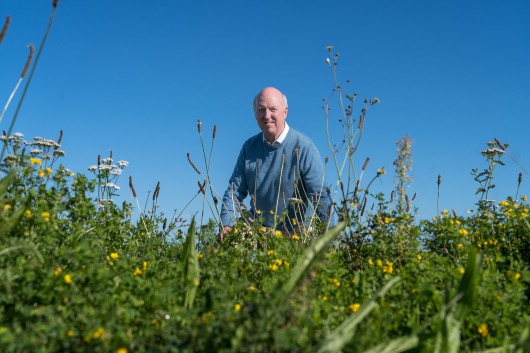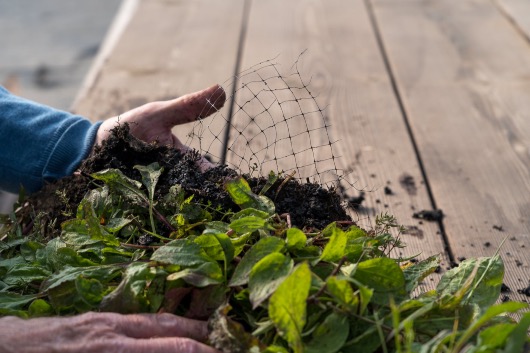
A leading UK turf grower is calling for the end of the use of plastic netting in turf – something he says is causing unseen environmental damage.
Stephen Fell, who owns Yorkshire-based business Lindum Turf, describes the plastic netting – which is in the majority of turf sold in the UK – as a completely avoidable source of pollution, adding few British consumers even know that most turf sold in the UK contains plastic.
The call is being supported by industry body the Turf Growers Association, which is encouraging its members to go plastic free by 2025.
Stephen made the call after Lindum Turf reported a threefold increase in sales of its plastic-free wildflower turf product over the past two years as the trend for replacing manicured lawns with wildflower meadows has gathered pace.
People buy wildflower turf to increase biodiversity and attract pollinators to their gardens, Stephen said, but are often appalled when they discover the product they are laying could cause significant damage to the environment.
“The trouble is, over time the plastic netting breaks down into microplastics and pollutes the soil and can leach off into watercourses,” Stephen said.
“But because the net is hidden within the turf and people can’t see it, they don’t know it is there. So, despite people having the best intentions of doing the right thing for the environment, they often don’t realise the damage choosing the wrong product can cause.
“It’s a throwback to earlier production methods the industry likes to keep quiet about. But technology has moved on. We have worked hard for many years to eliminate plastic from our turf, including our wildflower turf, and we believe it is now time for the rest of the industry to catch up.”

According to industry figures, around 70m sqm of turf are laid each year in the UK.
One argument employed by some turf growers to provide reassurance to consumers about the environmental credentials of their product is to describe the plastic ‘degradable’.
But this term often confuses consumers into thinking the plastic mesh used is biodegradable and therefore harmless to the environment.
Sadly, the opposite is true. Whereas ‘degradable’ plastic does degrade in the ground, it does so into harmful, polluting microplastics, and not harmless organic matter.
This can cause major issues in soil and water, and for wildlife.
Stephen added: “Wildflower turf is becoming incredibly fashionable. It is the only quick, easy, and reliable way to create a wildflower meadow which not only provides a beautiful spectacle to look at, it increases biodiversity and attracts vital pollinators.
“So, to create a product with that intention, only to line it with damaging single-use plastic seems perverse to me, especially when it is possible to create sturdy, plastic-free wildflower turf. The industry needs to address this issue and pledge to remove plastic from turf by 2030 at the latest.”
According to the TGA, the vast majority of UK turf growers use some kind of plastic turf netting in some or all of their products, meaning thousands of tons of single use plastics are being buried in the ground every year.
Not only does this cause issues with microplastics getting into the environment, farmers who let their land out to turf growers are being left with bits of plastic in their fields which cause problems when growing root crops like carrots and potatoes.
Birds, hedgehogs and other wildlife often suffocate or starve to death after getting trapped in the plastic debris.
Richard Owen, Chairman of the TGA, described the use of plastic turf netting as a major environmental problem.
He said: “It is very difficult to quantify exactly how much turf is laid in the UK, but it is likely that a significant amount of plastic turf netting is being put into the ground each year.
“This causes a problems for wildlife, for farmers on whose land the turf is grown, and most seriously, it decays into polluting microplastics that can leach into watercourses and get into the food chain.
“It is for this reason we are encouraging our members to stop using single use plastic mesh in their turf by 2025 and support calls for an industry-wide cessation.”
The view that single use plastics should not be in wildflower turf, or other types of turf, is also shared by Chelsea Flower Show organiser the RHS.
The organisation’s sustainability policy is working to reduce the use of three materials at its shows: concrete, virgin timber and plastics. Having already banned plastic bags and floral foam across the shows, they are aiming for the complete removal of single use plastics by 2025.
The nature of Lindum’s plastic free turf allows the RHS and the exhibitors who use it, to throw away less organic material after the shows as the RHS allows turf that is not reinforced or meshed to be left for reinstatement or composted.
Lindum Turf has not only exhibited their turf at RHS Chelsea for the past three shows, they are a supplier to the shows team and many garden designers. As more organisations like the RHS launch ambitious sustainability policies, companies like Lindum will be well placed to have the monopoly on the wildflower turf market.